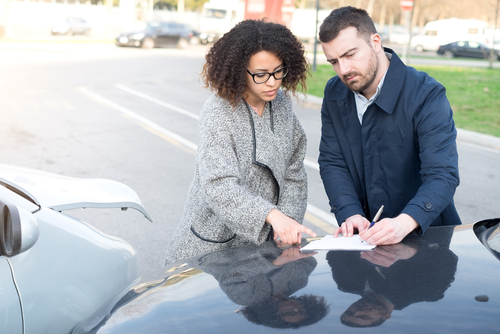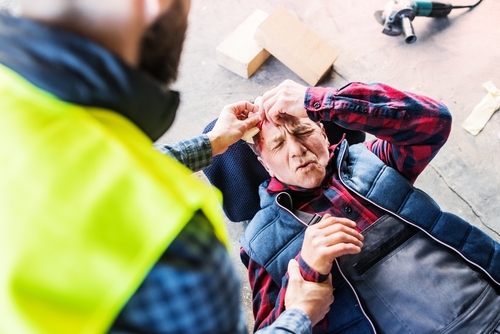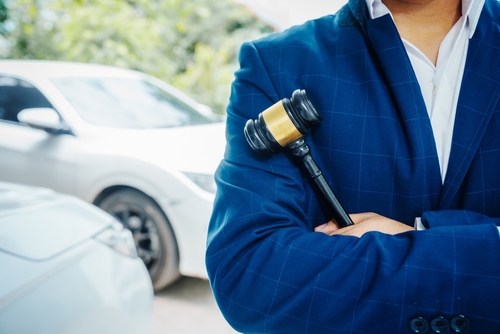Navigating the aftermath of a car accident can be overwhelming, especially when you’re unsure of the steps to take. At Humberto Law Firm, your trusted Cumming Car Accident Lawyer, we specialize in guiding car accident victims through the complex legal and insurance processes, ensuring you fully understand your rights and options. With our combined experience and dedication, Humberto Law Firm Cumming Car Accident Lawyer is well-equipped to assist you in recovering compensation, addressing medical expenses, and protecting your best interests following a motor vehicle accident.
What Should I Do Immediately After a Car Accident in Georgia? Ensure Safety and Check for Injuries
After an automobile accident in Georgia, your first priority should be safety. If possible, move your vehicle to a secure location away from traffic. This helps prevent further accidents and keeps everyone involved safe.
Next, check yourself and others for injuries. Look for visible wounds, pain, or any signs of distress. If anyone is hurt, call 911 immediately for medical assistance. Even if injuries seem minor, it is wise to seek medical attention. Some injuries may not be immediately apparent but can lead to serious complications later.
Taking these steps ensures that everyone is safe and allows you to focus on the next actions required after the accident. Prioritizing safety can also help you gather your thoughts and prepare for the legal and insurance processes that follow.
Call 911
After a car accident, your first step should be to call 911. Reporting the accident to law enforcement is crucial for several reasons.
Report the Accident to Law Enforcement
When you call 911 after a car crash, you will connect with emergency services. They will dispatch police officers to the scene. Officers will arrive to assess the situation, ensure safety, and document the incident. A police report can be vital for your insurance claim and any potential legal actions.
Request Medical Assistance if Needed
If anyone is injured, request medical assistance immediately. Even if injuries seem minor, it is best to have medical professionals evaluate everyone involved. Some injuries may not be immediately apparent, and prompt medical attention can prevent complications. Paramedics will assess injuries and provide necessary care on site or transport individuals to a hospital.
Importance of Documentation
The police will create an official report detailing the accident. This report will include important information such as the time, location, and circumstances of the accident. It will also document any injuries and statements from those involved. This report is essential for your insurance claim and can serve as evidence if disputes arise later.
Stay Calm and Cooperative
When speaking with the police, remain calm and cooperative. Provide accurate information about the accident without admitting fault. Your focus should be on ensuring everyone’s safety and obtaining the necessary assistance.
Calling 911 sets the foundation for the next steps in the accident process. It ensures that law enforcement and medical assistance are on the way, helping you manage the immediate aftermath of the incident effectively.

Exchange Information with Other Involved Parties
After ensuring safety and calling for help, the next crucial step is to exchange information with the other driver and all parties involved in the accident. This exchange will be vital for your insurance claim and any potential legal actions.
Collect Names, Contact Details, and Insurance Information
Start by gathering the names and contact information of all drivers involved in the crash. Make sure to note down their phone numbers and addresses. Next, ask for their insurance details, including the driver’s insurance company name and policy number. This information is essential for filing claims and determining liability.
Record Vehicle Details
In addition to personal information, document the details of each vehicle involved in the accident. Record the make, model, and year of each vehicle. Don’t forget to write down the license plate numbers. This information can help clarify the situation later and assist in any investigations.
Note Additional Details
If there are passengers in the vehicles, gather their names and contact information as well. If possible, take note of the circumstances surrounding the accident, such as weather conditions and road conditions. This context can be helpful for your case. Additionally, document any instances of distracted driving, as this can be crucial in establishing liability.
By following these steps, you will create a solid foundation for your insurance claim and any potential legal actions. Having accurate information will protect your rights and ensure you receive the compensation you deserve.
Document the Accident Scene
Car accidents require thorough documentation of the accident scene to build a strong case. This evidence can support your claim and help establish fault.
Take Photos of Vehicle Damage and the Surrounding Area
Use your phone or a camera to take clear photos of the vehicles involved. Capture the damage from multiple angles. Include close-ups of any dents or scratches. Also, photograph the surrounding area. This includes road conditions, traffic signs, and any relevant landmarks. These images can provide context for the accident.
Gather Contact Information from Witnesses
If there are witnesses present, ask for their names and contact information. Witness statements can be valuable in corroborating your version of events. Make sure to note what they observed regarding the accident. This information can help your case if disputes arise later about who was at fault.
By thoroughly documenting the accident scene, you will have important evidence to support your claim. This step is essential in protecting your rights and ensuring you receive the compensation you deserve.
Seek Medical Attention
After a car accident, your health is the top priority. Even if you feel fine, it is crucial to see a medical professional to evaluate and document any personal injuries. Some injuries may not be immediately apparent. Conditions like whiplash, concussions, or internal injuries can develop symptoms hours or days later.
Why You Should See a Doctor
- Early Detection: A doctor can identify injuries that might not be visible. Early treatment can prevent complications.
- Medical Records: A medical professional will document your injuries. These records are vital for any future insurance claims or legal actions.
- Treatment Plan: A healthcare provider can create a treatment plan tailored to your needs. This plan may include physical therapy, medication, or further tests.
What to Expect During Your Visit
- Assessment: The doctor will evaluate your condition, asking about your symptoms and any pain you may feel.
- Tests: They may recommend tests such as X-rays or MRIs to assess any hidden injuries.
- Follow-Up Care: Depending on your injuries, you may need follow-up appointments or referrals to specialists.
Communicate Openly
Be honest with your doctor about how the accident occurred and any symptoms you experience. This information helps them provide the best care possible.
Taking these steps ensures that your well-being is addressed promptly. It also strengthens your case if you decide to pursue a claim for medical expenses related to the accident. Prioritizing your health is essential after a car accident in Georgia.
Report the Accident to Your Insurance Company
Notifying your insurance company after a car accident in Georgia and filing a car accident claim is a crucial step. This action helps protect your rights and begins the claims process. Here’s what you need to know:
Notify Your Insurer as Soon as Possible
Contact your insurance provider promptly after the accident. Most insurance policies require you to report accidents within a specific time frame. Delaying this notification may affect your ability to file a claim. When you call, provide essential details about the accident, including the time, location, and the parties involved.
Provide Accurate Information
When speaking with your insurance adjuster, stick to the facts. Describe the accident clearly without speculating about fault or making assumptions. Share information about any injuries sustained and property damage. This accuracy helps your insurer assess the situation and process your claim efficiently.
Ask About Coverage and Next Steps
Inquire about your coverage options. Understanding your policy can clarify what damages and expenses are covered. Ask your insurer about the next steps in the claims process, including how to file a claim and what documentation is required.
Document Your Communication
Keep a record of all communications with your insurance company. Note the date and time of each call, the names of representatives you speak with, and any information they provide. This documentation can be helpful if there are disputes or delays in processing your claim.
Follow Up Regularly
Stay engaged with your insurance company throughout the claims process. Regular follow-ups can help ensure that your claim is being handled in a timely manner. If you encounter any issues, don’t hesitate to ask for assistance or clarification.
By promptly reporting the accident and maintaining clear communication with your insurance company, you can protect your interests and work towards recovering compensation for your damages. It can also be helpful to understand the types of compensation you can seek after a car accident as you navigate the process.
Gather and Preserve Evidence
After a car accident in Georgia, gathering and preserving evidence is crucial for your accident claim. This evidence can support your claim and help prove negligence. Here are key steps to take:
Obtain a Copy of the Police Report
The police report serves as an official document detailing the accident. It includes important information such as:
- The date and time of the accident
- The parties involved
- Witness statements
- Officer observations
Request a copy of the police report as soon as it becomes available. This document can be vital when filing your insurance claim or pursuing legal action.
Keep Records of Medical Treatments and Expenses
Documenting your medical treatments and expenses is essential for your claim. This includes:
- Medical bills
- Receipts for medications
- Records of doctor visits and treatments
Maintain a file with all related documents. This evidence will help demonstrate the impact of the accident on your health and finances.
Collect Additional Evidence
In addition to the police report and medical records, consider gathering other forms of evidence:
- Photos of the accident scene, vehicle damage, and any visible injuries
- Contact information from witnesses who can support your account of the accident
- Any correspondence with insurance companies
Preserving this evidence can strengthen your case and improve your chances of recovering compensation for damages. Taking these steps promptly after the accident will help you build a solid foundation for your claim.
Be Cautious When Communicating About the Accident
After a car accident, how you communicate can significantly impact your case. It is crucial to approach conversations carefully, especially with the other parties involved and their insurance companies.
Avoid Admitting Fault
Do not admit fault at the accident scene. Even if you think you may have contributed to the crash, avoid making any statements that could be interpreted as an admission of guilt. Fault can be complex and is determined based on the details of the accident. Saying “I’m sorry” or “I didn’t see you” may be interpreted as an admission of liability.
Limit Discussions with Other Parties
Keep conversations brief and to the point. Focus on exchanging necessary information, such as your name, contact details, and insurance information. Avoid discussing the specifics of the accident or your injuries. Anything you say could be used against you later in the claims process.
Be Wary of Insurance Companies
When speaking with the other driver’s insurance company, be cautious. They may reach out to gather information shortly after the accident. It is best to provide minimal information and avoid giving recorded statements. Insurance adjusters often look for ways to minimize payouts. You can refer them to your own insurance company or legal representative if you have one.
Document Everything
Keep a record of all communications related to the accident. This includes notes from conversations, emails, and any correspondence with insurance companies. Documenting these interactions can help protect your rights and provide important evidence if disputes arise later.
Seek Legal Advice
Consider consulting with a car accident attorney if you feel uncertain about how to communicate after the accident. An experienced attorney can guide you on what to say and how to protect your interests. They can handle discussions with insurance companies on your behalf, ensuring you do not unintentionally harm your case.
By being cautious in your communications, you can help safeguard your rights and strengthen your position as you navigate the aftermath of a car accident in Georgia.

Understand Georgia’s Car Accident Laws
Understanding Georgia’s car accident laws is crucial for anyone involved in a motor vehicle accident. These laws can significantly impact your ability to recover compensation for damages and injuries.
Statute of Limitations for Filing Claims
In Georgia, the statute of limitations for filing a personal injury claim after a car accident is two years from the date of the accident. This means you have two years to initiate legal action against the at-fault driver. If you miss this deadline, you may lose your right to seek compensation. It is essential to act promptly and gather necessary evidence within this timeframe.
Comparative Negligence Rules
Georgia follows a modified comparative negligence rule. This means that if you are partially at fault for the accident, your compensation will be reduced by your percentage of fault. If you are found to be 50% or more at fault, you cannot recover any damages. For example, if you are awarded $100,000 but found to be 30% at fault, you would receive $70,000. Understanding this rule helps you assess your situation and prepare for negotiations with insurance companies.
Importance of Evidence
Gathering evidence at the accident scene is vital. This includes taking photos, collecting witness statements, and obtaining a police report. Strong evidence can support your claim and demonstrate the other driver’s negligence.
Insurance Requirements in Georgia
Georgia requires all drivers to have minimum liability insurance coverage. This includes $25,000 for bodily injury per person, $50,000 for total bodily injury per accident, and $25,000 for property damage. If the at-fault driver does not have adequate insurance, you may need to seek compensation through your own uninsured motorist coverage.
Being informed about Georgia’s car accident laws is essential for protecting your rights and maximizing your potential compensation. If you have questions or need assistance, consider consulting an experienced car accident attorney who can guide you through the legal process and help you navigate your claim effectively.
Consider Consulting a Car Accident Attorney
After a car accident, consulting a car accident lawyer can be crucial for your case. An experienced attorney can guide you through the legal process and help you understand your rights. Here are key reasons to consider hiring a lawyer.
Legal Expertise
Car accident attorneys have in-depth knowledge of Georgia’s laws and regulations. They understand the nuances of car accident claims and can help you navigate the complexities of the legal system. Their expertise can strengthen your case and improve your chances of receiving fair compensation.
Assessment of Your Case
An attorney will assess the details of your accident, including evidence and witness statements. They can determine the strength of your case and advise you on the best course of action. This assessment is vital, especially if there are disputes over fault or if serious injuries are involved.
Negotiation with Insurance Companies
Insurance companies often aim to minimize payouts. An attorney can negotiate on your behalf, ensuring you receive a fair settlement. They know how to handle insurance adjusters and can present your case effectively. This negotiation can lead to better compensation for medical expenses, lost wages, and property damage.
Representation in Court
If your case goes to court, having an attorney is essential. They will represent you during hearings and trials, presenting your case clearly. Their experience in court can significantly impact the outcome of your case.
Peace of Mind
Car accident victims often find dealing with the aftermath of a collision to be stressful. Consulting a car accident attorney allows you to focus on recovery while they handle the legal aspects. This peace of mind can be invaluable during a challenging time.
In summary, consulting a car accident attorney can be a wise decision after a car accident in Georgia. Their expertise, negotiation skills, and representation can help you navigate the process and secure the compensation you deserve.
Follow Up on Insurance Claims and Medical Treatment
After a car accident in Georgia, following up on your insurance claims and medical treatment is crucial. This step ensures that you receive the compensation you deserve and that your medical needs are met.
Keep Track of All Accident-Related Expenses
Documenting all expenses related to your accident is crucial for building a strong claim and ensuring you seek full compensation for your losses. Thorough records will help support both economic and non-economic damages you may be entitled to. Here are some key areas to focus on:
- Medical Bills: Keep copies of all medical bills, receipts, and records for treatments, medications, rehabilitation, and any future care related to your injuries. These costs form the foundation of your medical expenses claim.
- Vehicle Repair Costs: Save all estimates, repair invoices, and receipts for fixing or replacing your vehicle. Property damage compensation is typically a key part of any car accident claim.
- Lost Wages: If your injuries prevent you from working—either temporarily or permanently—keep records of missed work and lost income. This may include pay stubs, tax returns, or a letter from your employer. You may also be able to claim future lost earning capacity if your ability to work is permanently affected.
- Other Out-of-Pocket Expenses: Track additional costs such as transportation to medical appointments, medical equipment, home care services, or other support you may need during recovery. These are valid economic damages and should not be overlooked.
In addition to these tangible financial losses, you may also be eligible for non-economic damages like pain and suffering or emotional distress, depending on how the accident has impacted your daily life.
By keeping detailed records from the start, you’ll be in a better position to seek the full range of compensation available under Georgia law.
Communicate with Your Insurance Company
Stay in contact with your insurance provider throughout the claims process.
- Provide Necessary Information: Be ready to submit all required documents, such as the police report, medical records, and any other relevant evidence.
- Follow Up Regularly: Check in with your insurance adjuster to ensure your claim is progressing. Ask about timelines and any additional information they may need.
- Be Honest and Clear: When discussing the accident, provide clear and truthful information to avoid complications with your claim.
Stay on Top of Medical Treatment
Prioritize your health by following through with all recommended medical treatments.
- Attend Appointments: Keep all scheduled medical appointments and follow your doctor’s advice. This not only aids in your recovery but also strengthens your case by showing that you are actively seeking treatment.
- Document Everything: Maintain records of all medical visits, treatments, and conversations with healthcare providers. This information can be crucial for your insurance claim and any potential legal action.
Consider Legal Assistance
If you face challenges with your insurance claim or if your injuries are significant, consider consulting a car accident attorney.
Understanding Your Rights: An experienced attorney from The Law Offices of Humberto Izquierdo, Jr., P.C. can help you understand your rights and navigate the claims process effectively.
Maximizing Compensation: Our legal team can assist in ensuring that you receive the maximum compensation for your medical expenses, lost wages, and other damages.
By diligently following up on your insurance claims and medical treatment, you can better manage the aftermath of your car accident and work towards recovery.
For expert legal guidance, contact Law Offices of Humberto Izquierdo, Jr., P.C. today to schedule a free consultation (770) 888-8901





